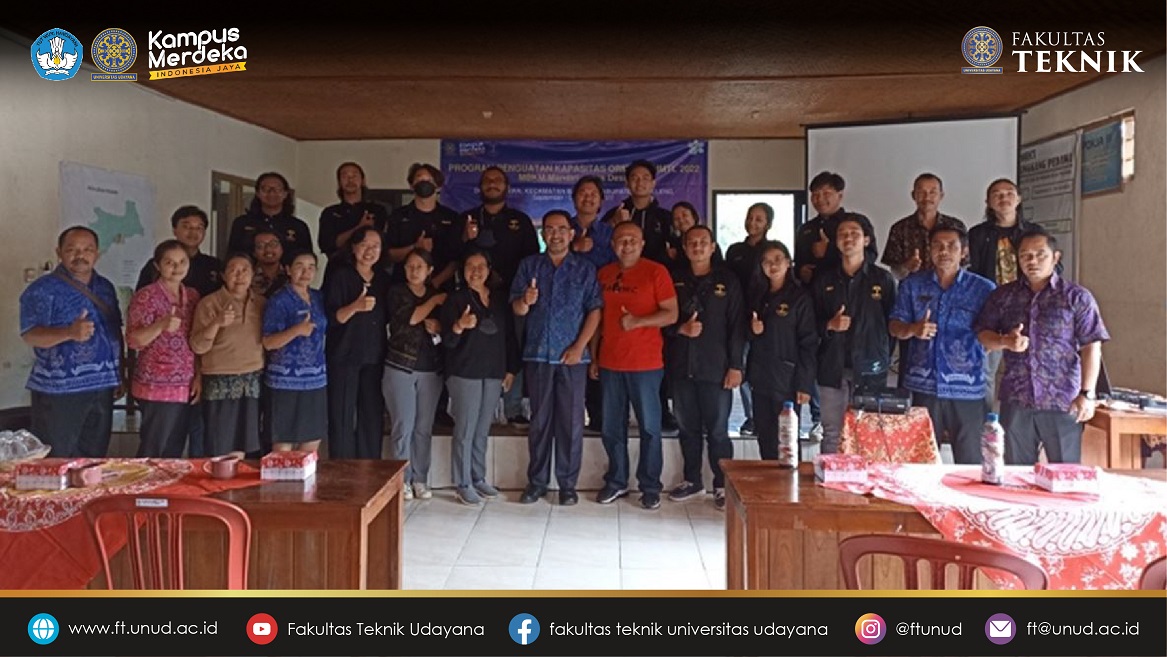Opening of the Program for Strengthening the Student Organizational Capacity of the Environmental Engineering Student Association
The Student Organization Capacity Building Program for the Environmental Engineering Student Association was opened on Tuesday, September 13, 2022. This Student Organization Capacity Building Program is a form of Independent Learning activity at the Merdeka Mandiri Campus Bina Desa organized by Udayana University. The opening activity was held in Pedawa Village, Banjar District, Buleleng Regency. The theme of the activity raised by the environmental engineering student association as the implementation of the program is the Digitization of Waste Bank Management and BSF Maggot Cultivation for Organic Waste in the Balawa Indah Community Group in Pedawa Village. A total of 15 students from the Environmental Engineering Study Program participated in the Program for Strengthening the Capacity of the Environmental Engineering Student Association Student Organization.
The implementation of the Program for Strengthening the Student Organizational Capacity of the Environmental Engineering Student Association was guided by a Field Supervisor in the implementation of this activity, namely Mrs. Ir. Kadek Diana Harmayani, ST., MT., Ph.D., who is also the Coordinator of the Environmental Engineering Study Program. In addition, students will be accompanied by the village party, represented by Mr. Arya Kekan as the coach of the Belawa Indah Community Group. This Community Group is the organization that manages the Waste Bank in Pedawa Village which is closely related to the Program for Strengthening the Capacity of the Environmental Engineering Student Association Student Organization. The implementation of the activity will take place in the Odd Semester of 2022 – 2023 for approximately 4 months, from September to December.
At the opening ceremony of this activity, the Field Supervisor and the Pembina of the Belawa Indah Community Group were present and gave a speech. The program was opened by Mr. Pedawa Village Secretary, Mr. Made Warsita Kusuma. The event was also attended by other Lecturers of the Environmental Engineering Study Program who will also assist in assisting the implementation of student activities. After opening by. Mr. Village Secretary, the event was continued with a presentation from the Coordinator of the Program for Capacity Building for the Environmental Engineering Student Association in Pedawa Village, Putu Agus Ary Wiratama, regarding the program plans to be implemented. The program coordinator also introduced examples of ecobricks that have been done and will be made in this activity as a form of structuring the Waste Bank into a Waste Management Educational Tour.
Pedawa Village is one of the Bali Aga villages (old village) located in Banjar District, Buleleng Regency with an area of ??16.68 km2. Putu Agus Ary Wiratama as Coordinator of the Program for Strengthening the Capacity of Student Organizations of the Environmental Engineering Student Association said that this is the background for the topic of this program is the geographical condition of the village which is located in the highlands which makes access to the village difficult and causes the development of village development to take place slowly, so that has an impact on the lack of facilities available in Pedawa Village, one of which is waste management facilities.
In 2018, a Waste Bank has been formed for independent plastic waste management which is managed by the Belawa Indah Community Group. In addition to inorganic waste management, the problem of organic waste generated by households also shows the need for further assistance regarding waste management. The outputs that are expected to be achieved in this program include mandatory outputs in the form of thematic Capacity Building and Soft Skills Books, executive summaries, electronic publication media in the form of videos, posters and profiles of program implementation results, as well as additional outputs in the form of application products and ICT-based waste management institutions, real products in the form of organic waste chopping machines and container boxes for BSF maggot cultivation, scientific articles, and mass media publications.










